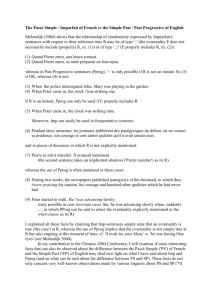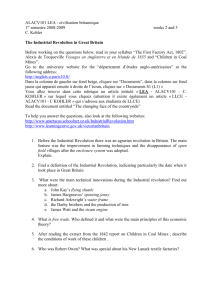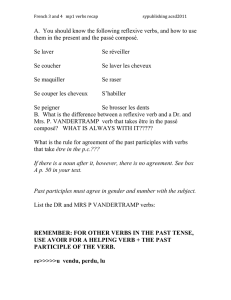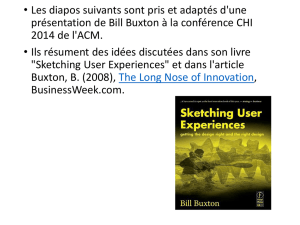F2-Ch8 PC IMP vacation
advertisement
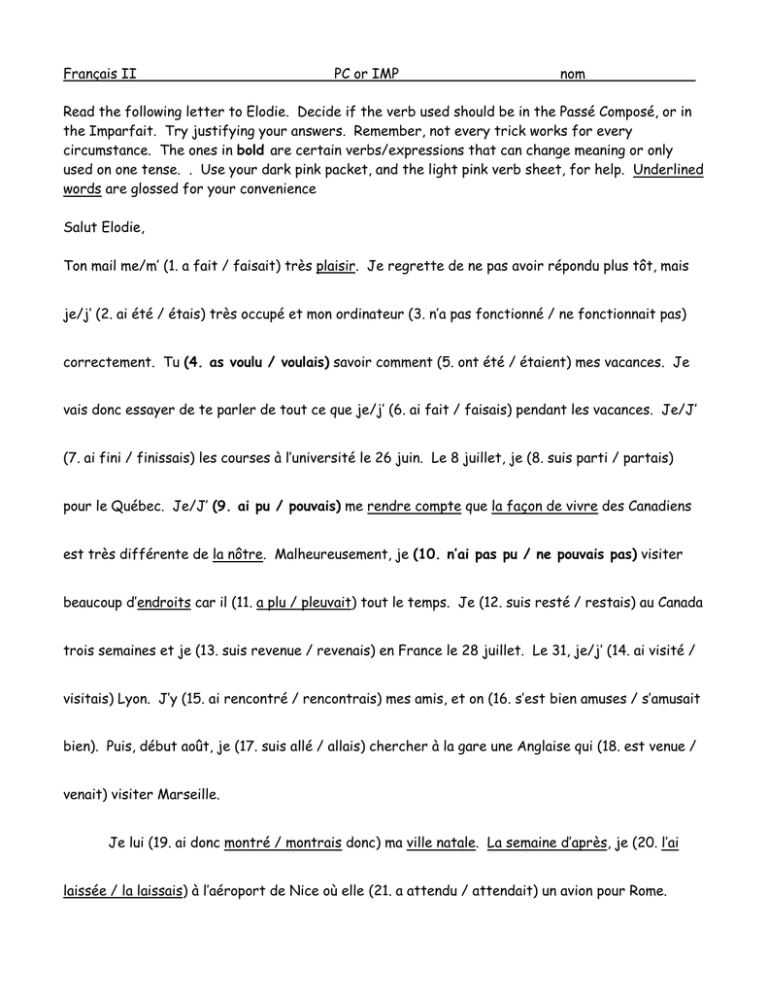
Français II PC or IMP nom Read the following letter to Elodie. Decide if the verb used should be in the Passé Composé, or in the Imparfait. Try justifying your answers. Remember, not every trick works for every circumstance. The ones in bold are certain verbs/expressions that can change meaning or only used on one tense. . Use your dark pink packet, and the light pink verb sheet, for help. Underlined words are glossed for your convenience Salut Elodie, Ton mail me/m’ (1. a fait / faisait) très plaisir. Je regrette de ne pas avoir répondu plus tôt, mais je/j’ (2. ai été / étais) très occupé et mon ordinateur (3. n’a pas fonctionné / ne fonctionnait pas) correctement. Tu (4. as voulu / voulais) savoir comment (5. ont été / étaient) mes vacances. Je vais donc essayer de te parler de tout ce que je/j’ (6. ai fait / faisais) pendant les vacances. Je/J’ (7. ai fini / finissais) les courses à l’université le 26 juin. Le 8 juillet, je (8. suis parti / partais) pour le Québec. Je/J’ (9. ai pu / pouvais) me rendre compte que la façon de vivre des Canadiens est très différente de la nôtre. Malheureusement, je (10. n’ai pas pu / ne pouvais pas) visiter beaucoup d’endroits car il (11. a plu / pleuvait) tout le temps. Je (12. suis resté / restais) au Canada trois semaines et je (13. suis revenue / revenais) en France le 28 juillet. Le 31, je/j’ (14. ai visité / visitais) Lyon. J’y (15. ai rencontré / rencontrais) mes amis, et on (16. s’est bien amuses / s’amusait bien). Puis, début août, je (17. suis allé / allais) chercher à la gare une Anglaise qui (18. est venue / venait) visiter Marseille. Je lui (19. ai donc montré / montrais donc) ma ville natale. La semaine d’après, je (20. l’ai laissée / la laissais) à l’aéroport de Nice où elle (21. a attendu / attendait) un avion pour Rome. Je/J’ (22. ai passé / passais) cinq jours merveilleux avec elle, et j’espère bien la revoir l’année prochaine. Après ça, je (23. n’ai rien fait / ne faisais rien) jusqu’au 15 août. Le lendemain, je (24. suis monté / montais) à Paris avec des amis et je (25. suis resté / restais) quelques jours là-bas. Je (26. suis allé / allais) t’envoyer une carte postale, mais je (27. n’ai pas eu / n’avais pas) le temps d’en acheter une. A mon retour, je/j’ (28. ai dû / devais) me preparer pour la rentrée. Voilà mes vacances résumées. Bon, je vais te laisser pour aujourd’hui. J’espère avoir bientôt de tes nouvelles. Bisous, André PS: Je (29. suis venu / venais) d’ouvir mon ordinateur quand je/j’ (30. ai reçu / recevais) tes vœux d’anniversaire. Merci! plaisir – to please se rendre compte – to realize la façon de vivre – the way of life la nôtre -ours un endroit – a place a plu / pleuvait (from pleuvoir – to rain) montré / montrais (from montrer – to show) la ville natale – birth city (a city in which one was born) La semaine d’après – the following week l’ai laissée / la laissais (from laisser – to leave) espérer – to hope (é è boot) jusqu’au - until suis monté à + a city – to ‘go up to’ a city Answer Key, with reasoning / meaning 1. PC – Your letter made me happy. Becoming happy happens in a *snap* 2. IMP – I was busy. Past state of being 3. IMP – my computer was not working properly. Past State of being 4. IMP – You wanted to know. IMP of vouloir = wanted. PC = to try 5. IMP - ..how my vacation was. Description of vacation. Could be past state of being, in a way 6. PC - I will try to tell you everything I *DID* during my vacation. Over and done. Completed 7. PC – I finished my classes. Completed past action 8. PC – I left for Québec. Also has exact time, triggering PC 9. PC – I managed to understand…focuses on the act, not the state of being. This one is hard. 10. PC – I was unable to visit…focuses on the act. Also a tough one. 11. IMP – it was raining the whole time. “tout le temps” = IMP trigger. 12. PC – I stayed in CA for three weeks. Time bound. Clear start/stop. PC 13. PC – I returned on the 28 July. Also time bound. 14. PC – the 31st, I visited Lyon. *snap*. Also time bound (I “used to” doesn’t work here, or 12-13) 15. PC – I met my friends there. *snap* Instant action. Focuses on the fact that it’s over. 16. PC – We had fun. (we used to/would have fun) doesn’t work. Over and done. 17. PC – I went to pick up (aller chercher – to pick up) an English girl. *snap* An X on the timeline 18. IMP - …who was coming to visit Marseille (tough one. She was on her way when the man went to the train station, so with 17 and 18, it’s kind of like interrupting/interrupted action.) 19. PC – I showed her my birth city. The tour takes time, but this focuses on the end of the action. 20. PC – I dropped her off at the airport. Over and done. 21. IMP - …where she was waiting for a plane. Past state of being, no clear time from. 22. PC – I spent 5 days with her. time-bound. 23. PC – I didn’t do anything until 15 August. Time bound 24. PC – the next day I went up to Paris – time bound, action is completed. 25. PC - …where I stayed for a few days. time-bound 26. IMP – I was going to send you (This is like the past-tense version of the Futur Proche) 27. PC - …but I didn’t have the time to buy one. Limited duration. (Tough one!...I would have said IMP because it seems like past state of being, but it’s time-bound from when you were in Paris) 28. PC – I had to prepare (IMP of devoir = supposed to) 29. IMP – I had just opened (this is a idiomatic phrase you do not know yet) 30. PC – when I received your birthday wished. kind of like interrupting action, also instant, in a *snap* action
